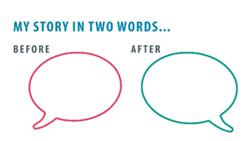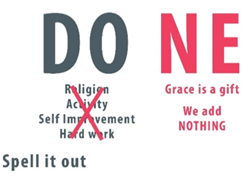‘The universe is made of stories, not of atoms.’ Muriel Rukeyser
I love this quote. Science doesn’t give us all the answers to life’s big questions. Ultimately the world isn’t about atoms, it’s about stories and how we understand who we are, and our purpose in life. The Christian faith is one unfolding story that spans human history, centred on Jesus Christ, and recorded in the Bible. It is only within this big story, that we find meaning and purpose for our individual stories.
A good story grabs attention and can disarm the listener. That is why one of the most convincing tools of evangelism, is the story of our personal experience with Jesus and how choosing to follow him makes a difference in our everyday life.
Telling your faith story
 Equipping participants with the confidence and skill to share their faith story was a key focus in the second gathering of Sharing Faith. Everyone was asked to note some key life moments such as the birth of a child, death of a parent or exam failure, as well as key points or people along the way that have influenced their understanding of God. Once these points were ordered, everyone had the opportunity to share their story in pairs in less than three minutes. This was a challenge but it helped people to refine their story down to the key details and, in some situations, you might only have a few minutes to share your story so it’s best to keep it brief. If people want to know more, they will ask follow up questions. Here are some top tips for sharing your story well:
Equipping participants with the confidence and skill to share their faith story was a key focus in the second gathering of Sharing Faith. Everyone was asked to note some key life moments such as the birth of a child, death of a parent or exam failure, as well as key points or people along the way that have influenced their understanding of God. Once these points were ordered, everyone had the opportunity to share their story in pairs in less than three minutes. This was a challenge but it helped people to refine their story down to the key details and, in some situations, you might only have a few minutes to share your story so it’s best to keep it brief. If people want to know more, they will ask follow up questions. Here are some top tips for sharing your story well:
- Be Humble. Christians sometimes come across as superior or arrogant when telling their stories. Remember you are still a sinner in need of God’s saving grace every single day.
- Be Clear. Don’t tell strange or complicated storylines that only make sense to you, or people from your context. Think about those who have never gone to church. Terms like ‘born again’, ‘saved’ and ‘accepting Jesus’ will be unfamiliar and misunderstood.
- Be Honest and don’t be afraid to share the uncertainties and struggles before and (importantly) after choosing to follow Jesus.
- After, After, After. Don’t spend most of your time talking about your life before Jesus. The most important part is your story AFTER becoming a follower of Jesus, and how that continues to shape you, and help you navigate the bumps of life.
- Make Jesus the hero, not you, or anyone else. The listener needs to hear that your acceptance, joy and fulfilment is because of Jesus and the good news of the gospel.
Your story in two words
Having a keyword/phrase for BEFORE and AFTER you found Jesus is a really simple way to think about telling your story to others. Firstly, think of single word or short phrase that would describe your life without Jesus. This could be something like: lost; lack of purpose; incomplete; searching; or broken.
 Take a minute and choose your BEFORE word.
Take a minute and choose your BEFORE word.
Then think of a single word or short phrase that describes the difference Jesus has made to your life. Answers here could be something like: rescued; loved; fixed; complete; found; or whole.
Take a minute and choose your AFTER word.
Repeating these words when telling your story will make it more memorable and meaningful for the listener.
Telling the gospel story
Most of us have a big gap between understanding the gospel and being able to explain it to someone else in a simple and succinct way. To do this well, we need to know the basics of the Christian message. Participants at Sharing Faith were introduced to some simple pictures they could use to explain the gospel, one of which was called ‘Spell it out’.
 On a piece of paper write the word DO and explain that a common misconception about Christianity is that it consists of a set of rules to be obeyed or practices in which to engage, all so that we can earn God’s approval. So, religion is about what we DO; it’s all about our activity, self-improvement, and hard work.
On a piece of paper write the word DO and explain that a common misconception about Christianity is that it consists of a set of rules to be obeyed or practices in which to engage, all so that we can earn God’s approval. So, religion is about what we DO; it’s all about our activity, self-improvement, and hard work.
Now add an N and E at the end to spell DONE. Explain that becoming a Christian is about accepting what Christ has done – not about our own actions. Like children, we are to accept that it is ‘done’ and there’s nothing we can add to Jesus’ finished work on the cross. We don’t earn forgiveness through a life of do’s and don’ts – that is impossible. Instead, salvation is already done. So, we simply accept God’s grace as a gift, and we experience a new life by faith in Jesus.
My faith is like a…
The last activity in this Sharing Faith session encouraged everyone to think of a memorable picture that illustrates their faith story and the gospel story. Participants were asked to think of an object, activity or idea that connects with their AFTER word. So, if your key word/phrase was RESCUED, then if someone  asks a question about your faith you might say:
asks a question about your faith you might say:
‘my faith in Jesus is a bit like a ‘lifebuoy’ because they are there to rescue people when they can’t save themselves, and Jesus came to rescue everyone because we can’t save ourselves. I realised that when I was 17 and my life was a bit of a mess…’
Take a minute to think about what your ‘My faith is like a…’ object might be and how you could use that to share your faith in a memorable way.
Hopefully the activities and discussions in this session of Sharing Faith will have helped grow people’s confidence in sharing their faith story and the gospel story with unreached friends in ways that are simple and understandable.
 Neil Harrison
Neil Harrison
Congregational Witness Development Officer